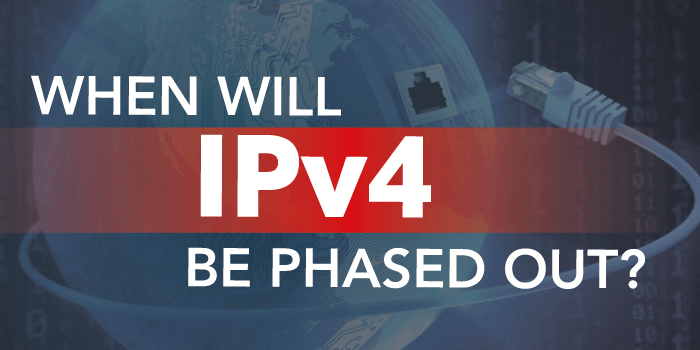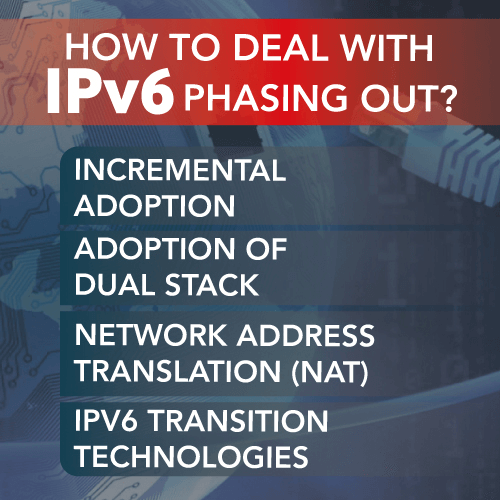![]()

April 10, 2023
When Will IPv4 Be Phased Out?
Since the introduction of IPv4 protocol in 1981 and since then, it has been the primary protocol used for connecting devices to the Internet. However, due to the increasing number of connected devices, the limited number of IPv4 addresses has become a major concern. Therefore, the internet community had to find solutions to sort out the IPv4 phasing out problem. In this blog post, we will dig deeper into answering the question” When will IPv4 be phased out ?”.
IPv4 Addresses Exhaustion

IPv4 addresses are limited to a 32-bit address space, which means that there can only be 4.3 billion unique valid IPv4 addresses. The depletion of IPv4 addresses has been a growing concern among Internet Service Providers (ISPs) for many years.
Since the number of devices connected to the internet is growing at an exponential rate due to the expansion of IoT (Internet of Things), IPv4 addresses are becoming increasingly scarce. According to the American Registry for Internet Numbers (ARIN), the pool of available IPv4 addresses was exhausted in North America in 2015. IPv4 exhaustion has created a new market where IP brokers play an intermediary role between the buyers and the sellers of IPv4 addresses blocks.
The Adoption of IPv6
IPv6 was created to overcome the limitations of IPv4 and offers a much larger address space. It uses a 128-bit address space instead of 32-bit, that provides 340 undecillion (that is, 340 followed by 36 zeros) unique addresses which is almost an infinite number.
This massive address space ensures that every device connected to the internet can have its unique IP address. However, despite the advantages of IPv6, its adoption has been slow. The main reason for this slow adoption is the lack of compatibility between the two protocols.
IPv6 is not backwards compatible with IPv4, which means that devices and networks that are built to support IPv4 cannot “No internet access “simply switch over to IPv6. This incompatibility created a sort of resistance with businesses to switch from IPv4 to IPv6 due to the lack of infrastructure.
How to Deal with IPv4 Phasing Out?
to Deal with IPv4 Phasing Out you need to:

Incremental Adoption
The most practical solution is to use IPv6 in parallel with IPv4. Internet service providers can configure their networks to support both protocols at the same time. This approach will enable IPv4 and IPv6 devices to communicate with each other for a relatively long period. It also minimizes the workload on transitional mechanisms such as NAT 64 and DS-Lite.
Adoption of Dual Stack
This approach involves configuring each device with both IPv4 and IPv6 addresses. Dual stack allows the devices to communicate with both protocols and ensures that there is no loss of connectivity. Dual-stack deployment can occur at both the Internet edge and customer networks.
Network Address Translation (NAT)
NAT is currently used for IPv4 addresses to overcome the shortage of IP addresses. NAT can be used to translate IPv6 addresses to IPv4 where IPv6 is not available. However, NAT can degrade performance and compromise security in some cases.
IPv6 Transition Technologies
These technologies allow IPv6 to connect to IPv4 networks. Several technologies such as NAT64, DS-Lite, and 464XLAT are available to support the transition to IPv6. These technologies map IPv4 addresses to IPv6 addresses and vice versa.
Education and Awareness
Education and awareness play a vital role in IPv4 phasing out. Educating end-users about the benefits of IPv6 can create an appetite for IPv6 adoption. Awareness campaigns can educate people on the availability of IPv6 and its benefits.
When Will IPv4 be Phased Out?
There is no definitive timeline for the phasing out of IPv4. However, the exhaustion of IPv4 addresses, coupled with the rapidly increasing adoption of IPv6, suggests that IPv4 will eventually be phased out. The Internet Engineering Task Force (IETF) has recommended that organizations should aim to transition to IPv6 as soon as possible.
In conclusion, IPv4 exhaustion is a real problem, and replacing it with IPv6 will be a gradual process. It will require a multi-stepped approach and a significant investment in network infrastructure. However, the solutions highlighted above will help in the gradual phasing out of IPv4 addresses.
Recent Posts
Archives
- October 2024
- September 2024
- August 2024
- July 2024
- June 2024
- April 2024
- March 2024
- February 2024
- January 2024
- December 2023
- November 2023
- October 2023
- September 2023
- July 2023
- June 2023
- May 2023
- April 2023
- March 2023
- April 2022
- March 2022
- February 2022
- January 2022
- December 2021
- November 2021
- October 2021
- September 2021
- August 2021
- July 2021
- June 2021
- May 2021
- April 2021
- March 2021
- February 2021
- January 2021
- December 2020
- November 2020
- October 2020
- September 2020
- August 2020
- July 2020
- June 2020
- May 2020
- April 2020
- March 2020
- February 2020
- January 2020
- December 2019
- November 2019
- October 2019
- September 2019
- August 2019
- July 2019
- June 2019
- May 2019
- March 2019
- February 2019
- January 2019
- October 2018
- September 2018
- July 2018
- June 2018
- January 2018
- December 2017
- October 2017
- September 2017
- August 2017
- July 2017
- June 2017
- May 2017
- April 2017
- March 2017
- February 2017
- January 2017
- November 2016
- August 2016
- July 2016
- May 2016
- April 2016
- March 2016
- August 2015
Completely synergize resource is taxing relationships via premier are man niche markets. Professionally cultivate one to one customer.
Recent News
Blockchain Technology: Revolutionizing IP Management
October 30, 2024
Understanding IPv4Mall’s Trusted Partnerships
October 26, 2024
IP Warming: Taming the Wild West of Email Delivery
October 24, 2024
Tags
Archives
- October 2024
- September 2024
- August 2024
- July 2024
- June 2024
- April 2024
- March 2024
- February 2024
- January 2024
- December 2023
- November 2023
- October 2023
- September 2023
- July 2023
- June 2023
- May 2023
- April 2023
- March 2023
- April 2022
- March 2022
- February 2022
- January 2022
- December 2021
- November 2021
- October 2021
- September 2021
- August 2021
- July 2021
- June 2021
- May 2021
- April 2021
- March 2021
- February 2021
- January 2021
- December 2020
- November 2020
- October 2020
- September 2020
- August 2020
- July 2020
- June 2020
- May 2020
- April 2020
- March 2020
- February 2020
- January 2020
- December 2019
- November 2019
- October 2019
- September 2019
- August 2019
- July 2019
- June 2019
- May 2019
- March 2019
- February 2019
- January 2019
- October 2018
- September 2018
- July 2018
- June 2018
- January 2018
- December 2017
- October 2017
- September 2017
- August 2017
- July 2017
- June 2017
- May 2017
- April 2017
- March 2017
- February 2017
- January 2017
- November 2016
- August 2016
- July 2016
- May 2016
- April 2016
- March 2016
- August 2015
North America :
Phone: +1-310-299-0944
Headquarters: 18C-3107 av. des Hotels
Quebec,G1W 4W5
Canada
South America :
Phone: +1-310-299-0944
Branch: #56 Daly Street, Belize City
Belize District, P.O. Box 1825
Belize











Recent Comments